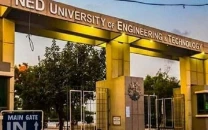Skills over certificates
Developed nations like Japan, Germany and China illustrate how skilled youth can drive economic prosperity.

Education is the preparation of the mind, the training for how to live a meaningful life, and the practice of morality. Instead of imparting real education to children, we often focus solely on awarding degrees to young people. Every year, we produce graduates from schools, colleges and universities, but many of them lack genuine education. This disconnect between education and skills contributes to unemployment in our country. A skilled youth is better equipped to create opportunities and drive progress.
Developed nations like Japan, Germany and China illustrate how skilled youth can drive economic prosperity. Universities in these countries focus on equipping young people with the skills necessary to create opportunities and improve their standard of living. Many of the items we use daily are products of Japanese, German or Chinese ingenuity. These nations prioritise educating their youth to boost their economies and provide their citizens with a better quality of life.
As a nation, we must embrace practical education. Education is not merely about earning a degree but acquiring skills and qualifications that can be applied in real life. Unfortunately, our youth often lack access to subjects such as morality and ethical values. As a responsible citizen, we should prioritise these subjects. Creativity and excellence in education, combined with moral values, pave the way for individual and national success.
It is high time we revisited the values underpinning our education system. Instead of encouraging students to memorise subjects for the sake of passing exams or earning certificates, we should emphasise the power of practical learning. Education should inspire creativity, innovation and a deeper understanding of the world.
The importance of practical education is well illustrated in movies like Slumdog Millionaire and Three Idiots.
In Slumdog Millionaire, a teenager from the slums of Mumbai becomes a contestant on Kaun Banega Crorepati, a quiz show. Jamal Malik, played by Dev Patel, is a boy raised in extreme poverty on the streets of Mumbai. Despite having no formal education, he possesses an extraordinary ability to maneuver life and society. His practical knowledge, gained through life experiences, enables him to answer all the questions on the quiz show and win the competition. The story portrays that a degree or certificate is not the sole measure of qualification. True education lies in the ability to learn from practical experiences and apply that knowledge in life.
Similarly, Three Idiots conveys the importance of genuine education. The central character, Rancho, played by Aamir Khan, advocates for education that focuses on practical experience and real-world application. Amir's friends, Farhan and Raju, initially follow the conventional path of rote learning. Farhan, who dreams of becoming a photographer, and Raju, who studies out of fear of poverty, represent the pressures many students face in traditional education systems. Rancho, in contrast, believes in the transformative power of education and inspires his friends to pursue their passions and think beyond societal expectations.
The distinction between these characters teaches a critical lesson: education is not about memorising facts like a robot. Rancho validates the value of creativity, practical aptitude and the belief that "necessity is the mother of invention". His ideas are rooted in day-to-day life, making education relevant and meaningful.
Education should not be a pressure cooker that chokes creativity and induces fear. When education becomes a tool for enlightenment and practical learning, it equips individuals with the confidence to face challenges. A degree may qualify someone on paper, but true education goes beyond formal qualifications. History is filled with the examples of individuals who achieved greatness through their practical vision and enlightened minds, without the backing of conventional degrees.
We must shift our focus from theoretical learning to practical education. This transformation will require changes in curriculum design, teaching methodologies and societal attitudes toward education. Integrating practical skills, moral values and creativity into our education system will help meet modern standards.













COMMENTS (2)
Comments are moderated and generally will be posted if they are on-topic and not abusive.
For more information, please see our Comments FAQ